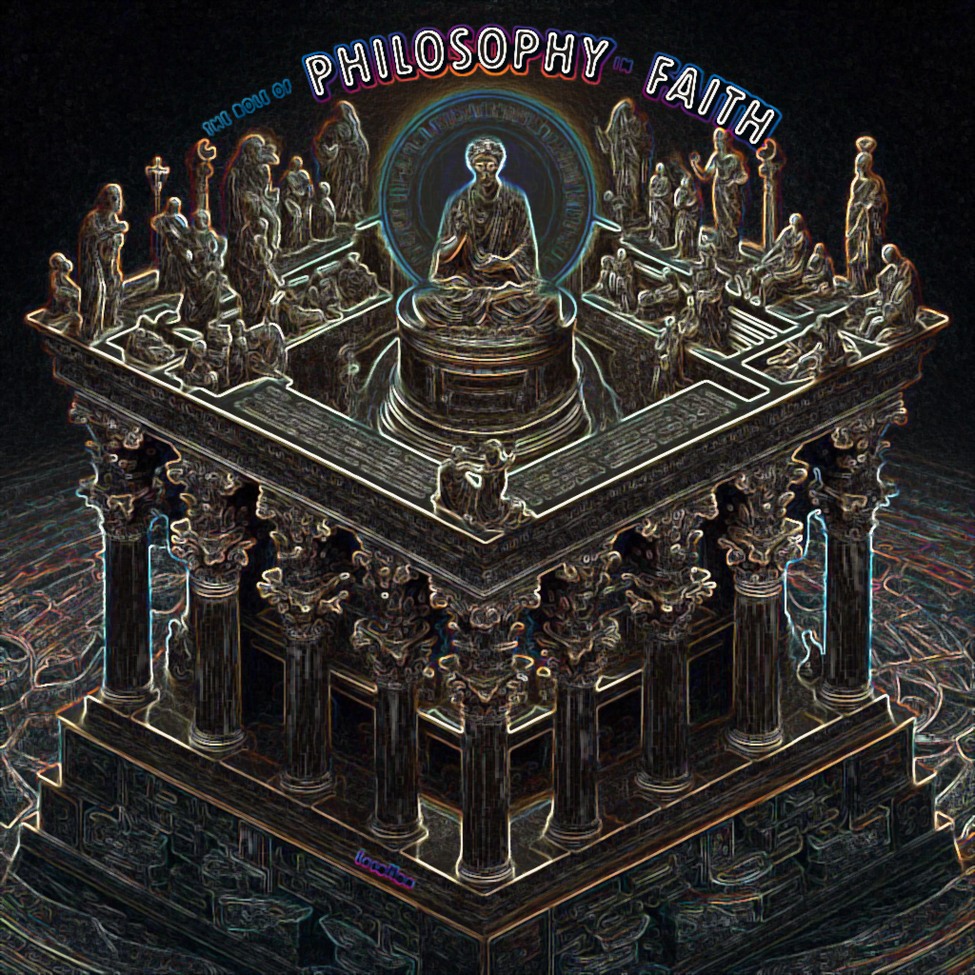Lesallan | April 6, 2025

The Role of Philosophy in Faith: Deepening Understanding of Christian Beliefs
The relationship between philosophy and faith, particularly within the context of Christianity, has historically been one of deep interdependence. Each discipline contributes to and enriches the other in meaningful ways. Philosophy offers a vital framework that allows believers to assess sacred doctrines and ethical imperatives systematically and analytically.
By engaging in rigorous reasoning and reflective inquiry, individuals are afforded the opportunity to investigate the rational foundations underpinning Christian beliefs. This exploration encourages not only a deeper understanding of faith but also a commitment to critical thinking and constructive scrutiny of established theological positions.
Philosophy invites believers to question, contemplate, and articulate their beliefs in an intellectually robust way. It challenges individuals to wrestle with fundamental questions about existence, morality, and the nature of divine revelation. In turn, faith can provide philosophy with a rich tapestry of existential meaning and ethical direction, grounding abstract philosophical concepts in the lived experiences and spiritual insights of believers.
This ongoing dialogue between philosophy and faith fosters a more nuanced and sophisticated understanding of both disciplines. It encourages openness to new interpretations and perspectives, acknowledging that both philosophical inquiry and faith can evolve over time. Furthermore, the interplay of these two realms can lead to a more holistic grasp of human experience, where the profound questions of existence are met with both intellectual rigor and heartfelt devotion.
By combining philosophical exploration and faith, individuals are better equipped to navigate the complexities of life, make informed ethical choices, and engage with the world around them in a thoughtful and compassionate manner. This relationship not only enhances personal belief systems but also contributes to a richer and more inclusive dialogue within the broader discourse on spirituality and morality.
Philosophical inquiry plays a crucial role in complementing theological principles by providing rigorous methodologies for analyzing fundamental concepts such as truth, existence, and morality. These concepts are not only vital in philosophy but are also essential in understanding and interpreting religious beliefs. For instance, explorations into the nature of divinity, the notion of free will, and the problem of evil represent significant themes that intertwine both theological discourse and longstanding philosophical debates.
In particular, the works of philosophers like McInerny, as seen in his book “A Student’s Guide to Philosophy” (McInerny, R.D., 1999), demonstrate how systematic reasoning can illuminate abstract ideas and facilitate deeper understanding. McInerny emphasizes the importance of critical thinking and logical analysis, encouraging readers to thoughtfully engage with themes that are not only intellectually rigorous but also spiritually significant.
This analytical approach provides believers with the tools needed to articulate and defend their convictions, fostering a more profound engagement with their faith. Moreover, it encourages openness to new insights that can enhance their comprehension of religious texts and doctrines. By bridging the gap between philosophical inquiry and theological exploration, individuals are better equipped to navigate the complexities of belief, allowing for a richer and more nuanced understanding of their spiritual journey. In this way, philosophical inquiry not only strengthens one’s personal convictions but also enriches the broader dialogue between faith and reason.
Philosophical methodologies serve a vital and multifaceted role in challenging and, at times, reshaping theological principles. In his seminal work, “Life’s Ultimate Questions: An Introduction to Philosophy (Nash, 1999), David Nash underscores the importance of engaging with fundamental existential inquiries. This inquiry establishes a bridge between empirical observation and spiritual belief, illustrating how philosophical exploration can illuminate aspects of faith that may otherwise remain unexamined (Nash, 1999).
Rather than undermining faith, this engagement fosters a dynamic interaction where doubts and uncertainties are not merely glossed over but are deliberately investigated and integrated into a more cohesive worldview. Philosophy encourages believers to confront challenging questions, facilitating a deeper understanding of their faith considering reason and rational discourse.
Consequently, philosophy acts as both a reflective surface and a powerful catalyst for growth. It reflects the rich intellectual legacy of Christianity, revealing the depth and complexity of its theological underpinnings. Simultaneously, it encourages the faith community to evolve through an ongoing dialogue between reason and revelation. This interplay not only enriches individuals’ spiritual lives but also invites a broader and more nuanced understanding of faith that can adapt to new insights and discoveries, leading to a more robust and resilient belief system. In this way, the relationship between philosophy and theology becomes a dynamic partnership, one that continually enhances both fields by fostering an environment of mutual inquiry and respect.
The interplay between philosophy and Christian faith serves as a profound catalyst for deepening one’s understanding of divine mysteries. By engaging in thoughtful philosophical inquiry, individuals are empowered to articulate the rational underpinnings of their ethical and theological beliefs more effectively. This process not only enriches personal spirituality but also cultivates a reflective community dialogue that invites diverse perspectives.
Through this engagement, believers are encouraged to critically examine their faith, considering both the challenges and certainties that arise. Such a robust dialogue transforms faith into a living, breathing exploration of truth, where questions and uncertainties are welcomed, leading to a more nuanced understanding of spiritual principles.
Furthermore, this philosophical approach promotes an environment where the pursuit of wisdom becomes an integral part of faith practice. As adherents grapple with profound questions about existence, morality, and the divine, they often find that their faith is revitalized and strengthened. This dynamic interaction not only fortifies individual conviction but also enhances communal discourse, ensuring that discussions about faith are approached with care, respect, and intellectual rigor.
The confluence of philosophy and Christian faith nurtures a spirituality that is both critically engaged and reflective. This allows believers to navigate the complexities of life with a thoughtful and informed approach. In doing so, they not only deepen their own faith but also contribute to a broader understanding of spirituality that can resonate within and beyond their communities.
In Christ,
Lesallan
References:
McInerny, R. M. (1999). A student’s guide to philosophy. ISI Books.
Nash, R. H. (1999). Life’s ultimate questions: An introduction to philosophy. Zondervan.



48 Comments
Dwight Wisener · April 10, 2025 at 11:15 am
Real wonderful visual appeal on this site, I’d rate it 10 10.
Patricia Sarconi · April 16, 2025 at 1:27 pm
Hi I am so thrilled I found your web site, I really found you by mistake, while I was searching on Bing for something else, Anyways I am here now and would just like to say cheers for a tremendous post and a all round interesting blog (I also love the theme/design), I don’t have time to read it all at the minute but I have bookmarked it and also added in your RSS feeds, so when I have time I will be back to read a great deal more, Please do keep up the excellent job.
Sex chat AI · April 16, 2025 at 1:45 pm
I would like to thnkx for the efforts you have put in writing this blog. I am hoping the same high-grade blog post from you in the upcoming as well. In fact your creative writing abilities has inspired me to get my own blog now. Really the blogging is spreading its wings quickly. Your write up is a good example of it.
miyabi savannah menu · April 16, 2025 at 2:04 pm
Greetings from Los angeles! I’m bored to death at work so I decided to check out your website on my iphone during lunch break. I enjoy the knowledge you present here and can’t wait to take a look when I get home. I’m shocked at how quick your blog loaded on my mobile .. I’m not even using WIFI, just 3G .. Anyhow, great site!
rajapola login · April 16, 2025 at 2:40 pm
Simply wanna input that you have a very decent internet site, I love the pattern it really stands out.
omaslot · April 16, 2025 at 6:44 pm
Those are yours alright! . We at least need to get these people stealing images to start blogging! They probably just did a image search and grabbed them. They look good though!
Mitolyn · April 17, 2025 at 2:44 am
obviously like your website but you need to check the spelling on several of your posts. Many of them are rife with spelling issues and I find it very bothersome to tell the truth then again I’ll definitely come back again.
https://www.retail-media.co.il/ · April 17, 2025 at 3:53 am
Hello there! This is my 1st comment here so I just wanted to give a quick shout out and tell you I truly enjoy reading your blog posts. Can you recommend any other blogs/websites/forums that deal with the same subjects? Thanks for your time!
cs 72 horas grátis · April 17, 2025 at 4:11 am
F*ckin¦ awesome issues here. I am very satisfied to peer your post. Thank you so much and i’m looking forward to touch you. Will you kindly drop me a mail?
Mitolyn · April 17, 2025 at 5:34 am
Hi, Neat post. There is a problem together with your web site in web explorer, may test this?K IE nonetheless is the marketplace chief and a good section of other people will leave out your great writing because of this problem.
BeastForce · April 17, 2025 at 6:03 am
It’s in reality a nice and helpful piece of info. I am satisfied that you just shared this helpful information with us. Please stay us up to date like this. Thank you for sharing.
depression · April 17, 2025 at 6:50 am
magnificent submit, very informative. I’m wondering why the other experts of this sector do not realize this. You must proceed your writing. I’m confident, you’ve a huge readers’ base already!
salt trick · April 17, 2025 at 7:42 am
Thank you for another great article. Where else could anyone get that type of info in such a perfect way of writing? I’ve a presentation next week, and I am on the look for such information.
Beast Force · April 17, 2025 at 9:31 am
This blog is definitely rather handy since I’m at the moment creating an internet floral website – although I am only starting out therefore it’s really fairly small, nothing like this site. Can link to a few of the posts here as they are quite. Thanks much. Zoey Olsen
TonicGreens · April 17, 2025 at 3:03 pm
I like this web site very much, Its a really nice situation to read and incur info . “Nunc scio quit sit amor.” by Virgil.
Tonic Greens · April 17, 2025 at 6:00 pm
I got what you intend,saved to bookmarks, very nice internet site.
Glyco Shield · April 17, 2025 at 7:10 pm
I am no longer positive where you’re getting your info, however great topic. I needs to spend a while learning more or understanding more. Thanks for magnificent info I was on the lookout for this info for my mission.
MemoForce · April 17, 2025 at 9:47 pm
magnificent post, very informative. I wonder why the other experts of this sector don’t notice this. You should continue your writing. I am confident, you have a great readers’ base already!
ลาคลอดได้กี่วัน · April 17, 2025 at 10:11 pm
I got good info from your blog
togelup · April 18, 2025 at 12:21 am
Good write-up, I’m normal visitor of one’s blog, maintain up the excellent operate, and It is going to be a regular visitor for a long time.
NerveFreedom · April 18, 2025 at 1:54 am
You should take part in a contest for one of the best blogs on the web. I will recommend this site!
https://mondria1.com/ · April 18, 2025 at 2:49 am
Hi, I think your site might be having browser compatibility issues. When I look at your website in Safari, it looks fine but when opening in Internet Explorer, it has some overlapping. I just wanted to give you a quick heads up! Other then that, fantastic blog!
Prime Biome · April 18, 2025 at 4:11 am
Hi! I’m at work surfing around your blog from my new iphone! Just wanted to say I love reading your blog and look forward to all your posts! Keep up the great work!
PrimeBiome · April 18, 2025 at 8:12 am
Hello, Neat post. There is an issue together with your website in web explorer, would test this?K IE still is the market leader and a good portion of other folks will leave out your fantastic writing due to this problem.
Soulmate Sketch · April 18, 2025 at 11:19 am
I like this blog very much, Its a really nice office to read and find information. “If at first you don’t succeed, you’re running about average.” by M. H. Alderson.
sewa hiace premio · April 18, 2025 at 12:33 pm
I appreciate, cause I found exactly what I was looking for. You have ended my 4 day long hunt! God Bless you man. Have a great day. Bye
rajabandot login alternatif · April 18, 2025 at 4:35 pm
I was looking through some of your articles on this internet site and I believe this site is very informative ! Keep posting.
consultoria de vendas BH · April 18, 2025 at 4:44 pm
You are my inspiration , I possess few blogs and occasionally run out from to post : (.
Tonic Greens · April 18, 2025 at 7:29 pm
Hi, I think your site might be having browser compatibility issues. When I look at your website in Safari, it looks fine but when opening in Internet Explorer, it has some overlapping. I just wanted to give you a quick heads up! Other then that, fantastic blog!
cs teste · April 18, 2025 at 9:18 pm
I like what you guys are up too. Such intelligent work and reporting! Carry on the excellent works guys I’ve incorporated you guys to my blogroll. I think it’ll improve the value of my website :).
rajabandot link alternatif · April 18, 2025 at 9:32 pm
I think this is among the most vital information for me. And i am glad reading your article. But want to remark on few general things, The site style is perfect, the articles is really great : D. Good job, cheers
เคลียร์ริ่งพื้นที่ · April 18, 2025 at 10:55 pm
My brother suggested I might like this web site. He used to be entirely right. This publish actually made my day. You can not imagine simply how much time I had spent for this info! Thanks!
rajabandot · April 19, 2025 at 4:55 am
I am not really wonderful with English but I find this real leisurely to interpret.
https://www.vacationsperfected.com · April 19, 2025 at 9:11 am
Really wonderful information can be found on weblog.
Beast Force Reviews · April 19, 2025 at 10:03 am
You have remarked very interesting points! ps decent internet site.
BeastForce · April 19, 2025 at 12:44 pm
You got a very excellent website, Glad I found it through yahoo.
www.premierpoolstallahassee.com · April 19, 2025 at 2:38 pm
As a Newbie, I am always searching online for articles that can help me. Thank you
rajabandot login · April 19, 2025 at 3:06 pm
Hello.This post was extremely motivating, especially because I was searching for thoughts on this subject last Thursday.
Nerve Freedom · April 20, 2025 at 1:39 am
Wow that was odd. I just wrote an really long comment but after I clicked submit my comment didn’t show up. Grrrr… well I’m not writing all that over again. Anyway, just wanted to say fantastic blog!
Tonic Greens · April 20, 2025 at 3:44 am
Real nice design and style and fantastic written content, nothing else we need : D.
ace90bet · April 20, 2025 at 7:18 am
I have been exploring for a little for any high-quality articles or weblog posts on this sort of house . Exploring in Yahoo I finally stumbled upon this site. Studying this information So i am glad to convey that I’ve a very just right uncanny feeling I discovered just what I needed. I so much indubitably will make certain to don?¦t put out of your mind this website and give it a look on a relentless basis.
Prime Biome · April 20, 2025 at 8:28 am
You got a very fantastic website, Gladiola I noticed it through yahoo.
Tonic Greens · April 20, 2025 at 10:24 am
I’m not sure where you’re getting your info, but good topic. I needs to spend some time learning much more or understanding more. Thanks for wonderful information I was looking for this info for my mission.
car image editing · April 20, 2025 at 11:17 am
Hi, i think that i saw you visited my web site thus i came to “return the favor”.I am trying to find things to enhance my site!I suppose its ok to use some of your ideas!!
mitolyn reviews · April 20, 2025 at 2:25 pm
Thank you a lot for sharing this with all of us you really recognise what you are talking about! Bookmarked. Kindly also talk over with my website =). We may have a link trade arrangement among us!
ace90bet · April 20, 2025 at 5:17 pm
I appreciate, cause I found exactly what I was looking for. You have ended my 4 day long hunt! God Bless you man. Have a nice day. Bye
glyco shield · April 20, 2025 at 6:52 pm
You are a very intelligent individual!
natural mounjaro · April 20, 2025 at 9:20 pm
This internet site is my aspiration, very wonderful design and perfect subject matter.
Comments are closed.